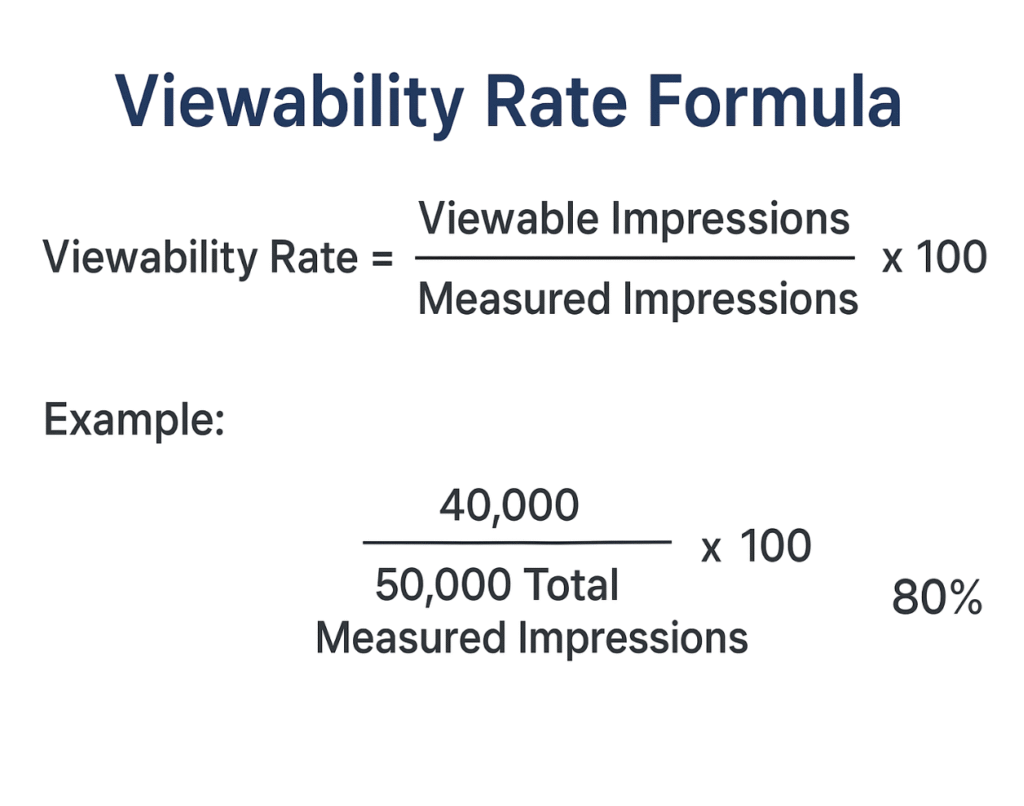Viewability Rate Calculator

What is Viewability Rate?
Viewability Rate is the percentage of served impressions that meet the Media Rating Council (MRC) standard:
For display ads: at least 50% of pixels must be in view for 1 second.
For video ads: at least 50% of pixels must be in view for 2 consecutive seconds.
This metric helps you understand whether your ads are truly being seen by your audience.
What is Viewability Rate?
Viewability Rate is the percentage of ad impressions that are actually viewable to users.
According to the Media Rating Council (MRC) standard:
Display Ads → At least 50% of pixels visible for 1 second.
Video Ads → At least 50% of pixels visible for 2 consecutive seconds.
This metric ensures that advertisers only pay for ads that real people can see.
Why is Viewability Rate Important?
✅ Advertisers → Ensure budgets aren’t wasted on unseen ads.
✅ Publishers → Improve ad inventory quality and increase CPM.
✅ Marketers → Optimize placements, devices, and formats for higher ROI.
👉 A 70%+ viewability rate is generally considered good.
Summary
Easily calculate your ad viewability rate online. The Viewability Rate shows the percentage of ad impressions that were actually viewable by users. Advertisers and publishers use this metric to measure the effectiveness of display and video ads.
Frequently Asked Questions
To calculate Viewability Rate, you divide the number of viewable impressions by the number of measured impressions, then multiply the result by 100 to get a percentage.
Formula:
Viewability Rate (%)=
Viewable Impressions / Measured Impressions×100
Example:
If you had 40,000 viewable impressions out of 50,000 total measured impressions:
40,000 / 50,000 x 100 = 80%
This metric helps advertisers and publishers understand whether ads are actually being seen by users, making it one of the most important KPIs in digital advertising.
Viewability Rate measures how many ads were actually seen by users, rather than just being served. For display ads, at least 50% of the ad pixels must be visible for 1 second, and for video ads, at least 50% of the pixels must be visible for 2 consecutive seconds (per MRC guidelines).
This metric shows advertisers and publishers whether their ads are genuinely reaching audiences.
Industry benchmarks vary, but according to the Interactive Advertising Bureau (IAB) and MRC standards, a 70%+ viewability rate is considered strong.
Display ads: Average ~66% viewability
Video ads: Average ~70–75% viewability
Higher than average rates indicate premium placements and better user engagement.
A good viewability rate is typically 70–80% or higher. For video ads, publishers and platforms often target 75%+. However, the “good” rate depends on your campaign goals, ad format, and industry.
The Media Rating Council (MRC) defines viewability as:
Display ads: At least 50% of pixels visible for 1 continuous second.
Video ads: At least 50% of pixels visible for 2 consecutive seconds.
This standard is used worldwide as the baseline measurement for ad viewability.
The formula is straightforward:
Viewability Rate=
Viewable Impressions / Measured Impressions × 100
This helps marketers understand the percentage of ads seen versus ads served.
You can increase ad viewability by:
Placing ads above the fold where users naturally see them
Reducing page load time so ads appear faster
Using responsive ad formats that adapt to devices
Avoiding excessive ad clutter
Optimizing for mobile viewability, since most traffic comes from mobile devices
Viewability can be measured using tools such as:
Google Ads / DV360 reports
IAS (Integral Ad Science)
MOAT Analytics
DoubleVerify
Or simply by using our Viewability Rate Calculator to check the percentage instantly.
Common reasons for low ad viewability include:
Ads placed below the fold
Slow-loading ads that users scroll past
Excessive ad clutter
Poor mobile optimization
Ads served in non-active tabs or hidden windows
Yes ✅ Viewability is a key performance indicator (KPI) in digital advertising. It reflects whether ads are being seen by real people, making it a vital metric for:
Advertisers → Ensuring ROI
Publishers → Improving inventory quality
Marketers → Optimizing campaign performance


